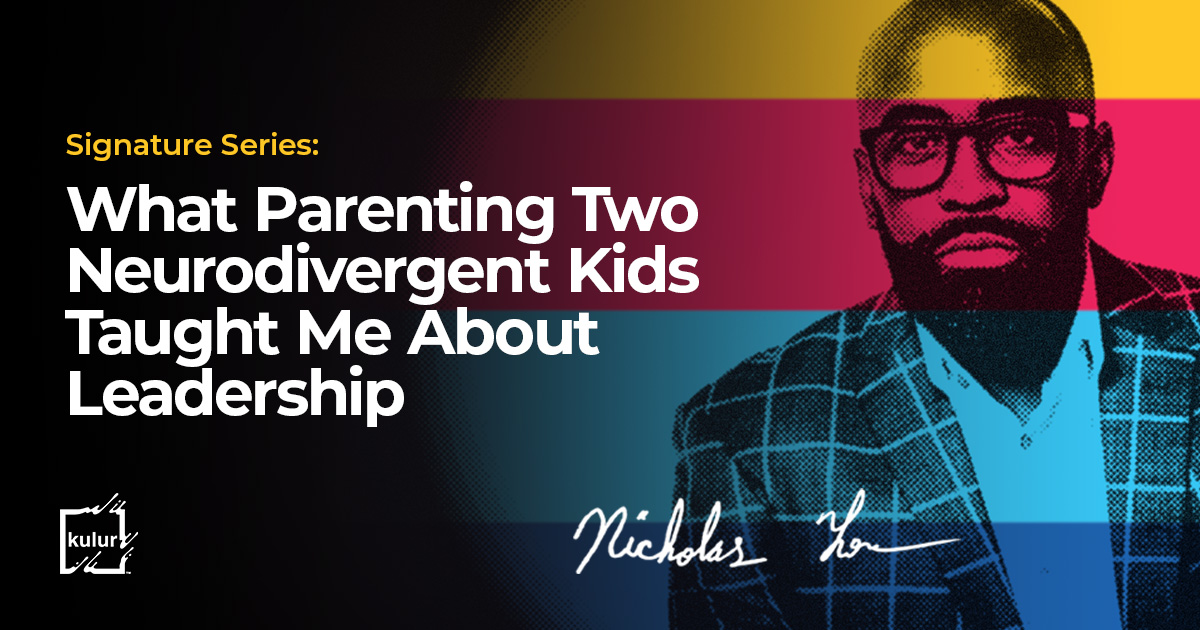What Parenting Two Neurodivergent Kids Taught Me About Leadership


When we talk about the importance of autism awareness and acceptance, I can’t emphasize both enough. A few years ago, while at the airport, I stopped by a restaurant to grab a quick bite. Instead of heading to my gate, I decided to sit down, eat, and get some work done. As I was finishing my meal, I sensed someone nearby. Within seconds, an employee at the restaurant grabbed my plate and cup.
At that moment, my instinctive reaction was about to be fueled by frustration until I looked up, made eye contact, and realized the individual was on the spectrum and simply doing their job. It was one of those moments that as someone seeing similar behaviors on a daily basis, I recognized it for what it was but more importantly, what it wasn’t. I held back my initial reaction and tried to smile, but I couldn’t. I immediately began to cry, overwhelmed by the thoughts of my own children. I couldn’t help but wonder what might’ve happened if that had been my child, and the person they encountered couldn’t extend the same understanding. For parents of children on the spectrum, this is the reality we face every single day.
As a parent raising two children on the autism spectrum while also building a business, leading teams, and teaching, the line between my professional and personal life has never really existed. These worlds are deeply intertwined – each one influencing how I navigate the other, every single day. That’s why, when April arrives and conversations are around National Autism Awareness Month, it feels deeply personal. For me, awareness isn’t limited to a campaign or cause. It’s a daily reality that has profoundly reshaped how I show up in every role I hold.
What Parenting Taught Me About Leadership
One of the most important skills we talk about in leadership is active listening. However, raising neurodivergent children has taught me that listening is not only about what’s said but observing, interpreting, and understanding even the subtlest cues.
My daughter doesn’t always express herself the way my son does. Over time, I’ve had to learn how to “listen” with more than my ears. That sensitivity has extended into how I manage teams, resolve conflict, and build relationships at work. It’s made me more thoughtful, more present, and more empathetic. And that shift matters because authentic connection drives stronger culture, better collaboration, and healthier workplaces.
The Realities of Work-Life “Balance”
Let me be real with you. I’ve taken work calls from the car while dropping my daughter off at Applied Behavior Analysis (ABA) therapy. I’ve been in Zoom meetings with my son climbing on my shoulders. I’ve smiled through presentations while trying to redirect my kids from actually climbing the walls. That’s not “disruption” – that’s our normal.
And while people might say, “That’s just kids,” here’s the truth: at some point, most kids grow out of that phase. But I’m eight years into this journey and that “just kids” phase hasn’t passed. This is a different kind of parenting. It’s a different kind of patience. A different kind of leadership. I don’t get to turn it off when the meeting starts, and I’ve had to stop caring what other people think about that.
Now? I stand on business. I’ve learned that not all parenting stories sound like weekend playdates and neighborhood hangouts. And for a while, I felt like I had to hide that.
Why It’s Changed How I Lead
I’ve never been the kind of leader who cares about clocking in at nine and logging off at five. I care about outcomes. And since becoming a dad to two amazing children with autism, that belief is both a leadership and survival philosophy.
If the work is getting done, I don’t micromanage how it happens because I truly believe that vision is singular and leadership is plural. Everyone’s path is their own, and I lead with that understanding. As a dad to two neurodiverse kids, I know what it’s like to show up to a meeting on two hours of sleep because my child was up turning on lights at 2:30 a.m. and didn’t fall back asleep until 5. I know the weight of carrying that silently, then flipping the switch to professional mode with no one ever asking what support is needed.
I’ve seen firsthand how much working parents carry without ever saying a word. I’ve lived the days where emotional resilience is all you have. And I’ve also seen how few companies ask, “What support do you need?” Since becoming a dad, very few employers asked me that. Very few.
So no, I don’t care about my team’s start and end time. I care about how they are doing, and whether they feel supported enough to keep going.
We Need More Fathers in the Conversation
There’s a visibility gap. Too many fathers, especially Black fathers, are silent about what life looks like raising kids on the spectrum. Vulnerability is still taboo. But how can change happen if we’re all pretending?
I’ll never forget when Kofi Amoo-Gottfried, CMO of DoorDash, reached out to me after hearing me speak about my kids during Monday Night Mentorship. He sent a message saying he had a child on the spectrum too—and that if I ever needed someone to talk to, he was there. That small gesture meant everything. That’s what community looks like. That’s how we create space for each other to lead and live fully.
A Note to Employers: Want to Keep Great Talent? Do Better.
If companies genuinely want to retain diverse, high-performing employees, it’s important to understand what meaningful support actually looks like. Here are a few places to begin:
- Reevaluate your benefits. ABA therapy, speech therapy, and other autism-related services aren’t always covered. Don’t claim “great insurance” if it doesn’t support neurodiverse families.
- Get real about time off. Unlimited PTO sounds great until nobody feels comfortable using it. Create systems where parents don’t have to choose between care and career.
- Support mental health. Don’t just say you care. Show it by offering therapy options, flexibility, and a culture that encourages people to show up as their full selves.
When companies make space for real life, they retain talent and build loyalty and trust. Employees balancing intense responsibilities at home, especially in remote environments where personal and professional lines often overlap, need to feel seen and supported.
It’s Time to Lead with Love
We often say we value authenticity in leadership. It’s easy to champion the idea of “bringing your whole self to work,” but are we truly prepared for what that looks like in practice? For me, it means leading a business while raising two children whose world doesn’t always align with traditional expectations. It’s late nights, therapy sessions, client meetings, diaper changes, and everything in between. It’s not always polished, but it’s real.
I’m not sharing this for sympathy. I’m sharing my story so the father navigating a similar reality knows he’s not alone. So the HR leader rethinks what meaningful support looks like. So colleagues understand that parenting, especially with neurodiversity, isn’t separate from how we show up at work.
Life, leadership, and love are all connected. And if we’re not leading with love, what are we really leading for?

